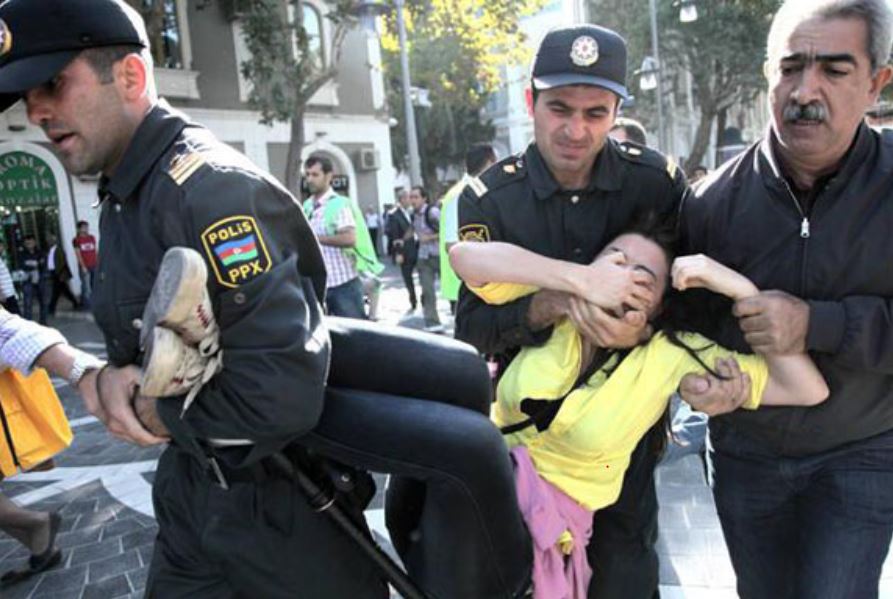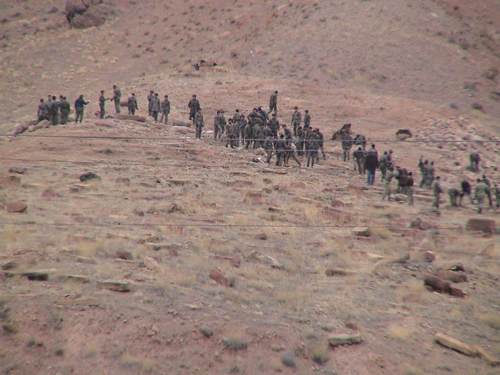Over the past several years, the post-Soviet petrostate of Azerbaijan has sought to promote a sanitized image of itself through a targeted media campaign. From elaborate architectural investments, such as the $250,000,000 Heydar Aliyev Center, to all-expenses-paid trips for American and European politicians, the ruling regime has used its vast oil wealth in an attempt to polish its bruised image. This comes on the heels of a slew of exposés criticizing widespread corruption and an abominable human rights record, including the persecution of journalists in this Caspian state.

Azerbaijani police detain an opposition activist during a protest rally in Baku, Azerbaijan on Oct. 20, 2012 (Photo: AP/HRW)
The most recent public relations stunt has been the country’s “Land of Tolerance” campaign, which claims that the Azerbaijan is a utopia for all three Abrahamic religions and the myriad ethnicities that live within its borders. The reality, however, is that the country in no way resembles this manufactured religiously and ethnically pluralistic haven. Since the decline of the Soviet Union, the history of Azerbaijan has been rife with ethnic and religious persecution.
This year marks the 30th anniversary of the beginning of anti-Armenian pogroms in the city of Sumgait. On Fe. 27, 1988, local Azerbaijani mobs broke into the houses of unarmed Armenian civilians in the city of Sumgait to murder and sexually assault them. As Thomas de Waal writes in his book Black Garden: Armenia and Azerbaijan Through Peace and War, “roving gangs committed acts of horrific savagery. Several victims were so badly mutilated by axes that their bodies could not be identified.” These crimes were committed under the direct order of the political leadership of the country in response to the peaceful demonstrations in Stepanakert and Yerevan hundreds of miles away.
The massacres and violence only ceased when the central government in Moscow declared martial law and sent in troops. These atrocities were committed solely on the basis of ethnic and religious hatred towards the local Christian Armenians, and led to the forced expulsion of hundreds of thousands of ethnic Armenians from Azerbaijani-controlled territory. Three decades later, these refugees are still unable to return to their homes, and all property that they could not carry on their backs has been stolen by the ruling regime. As a result of the government’s campaign to purge all Armenians from the land it controls, there is no substantial Armenian population left in the Republic of Azerbaijan today.
In addition to the human suffering it has caused, the Azerbaijani state has been keen to eliminate any trace of Armenian civilization on the land it controls. In the exclave of Nakhichevan—where the ruling Aliyev clan hails from—the Azerbaijani government undertook a carefully planned campaign of destruction of the Armenian stone-carved crosses, known as khachkars, in 2005. Azerbaijani soldiers and local vandals used a variety of methods to obliterate the crosses, including using them for target practice, and taking sledgehammers to the intricately carved medieval gravestones, which were registered on the UNESCO-designated Intangible Cultural Heritage list. This act was not only ethnically motivated, but also had religious undertones, as the crosses are a unique symbol of the Armenian church and Armenia’s role as the first country to officially adopt Christianity as a state religion.

Uniformed men, identified as Azerbaijani soldiers, filmed in 2005 destroying the tombstones at the Julfa cemetery in Nakhichevan (Photo: Wikimedia Commons)
The ruling regime’s intolerance is not limited to persecuting Christians. Though the vast majority of the country’s current population is Shiite Muslim, the government has put a number of restrictions on religious freedom for its citizens. Last fall, the dictatorial regime approved a bill that would ban the participation of children in the remembrance of Ashura, the most important Shiite holiday, which commemorates the slaying of a religious figure by a tyrant. In 2015, the commemorations were banned entirely in Ganja, the second largest city in the country, as well as in the city of Nardaran, and several locales in the Nakhichevan area.
Rallies by anyone opposing the ruling party are viewed with suspicion by the regime, but particularly the religious opposition, who they allege maintain support from the Iranian government. The religiously conservative city of Nardaran has been a hotbed of tension against the ruling Aliyev clan, who have maintained nearly continual power over the country since 1969. In Nov. 2015, more than six people were killed by regime forces, after they raided the city and attempted to imprison a number of its inhabitants. In Jan. 2016, the city was again plunged into chaos after the government arrested more than 60 civilians, which it claimed had been preparing for an uprising. They later sentenced 17 of them to a combined 270 years in prison.
In addition to the Shiite majority, the second largest religious group in the country, Sunni Muslims, are equally targeted by the authorities. Most Sunni Muslims are from ethnic minorities that inhabit the impoverished northern part of the country, which makes them doubly targeted by the ultranationalist regime. Since the collapse of the Soviet Union, the Lezgi people have been among the most vocal to seek greater linguistic, religious, and cultural autonomy vis-à-vis a state that attempts to forcibly assimilate all diversity in the areas it controls. In the early 1990s, a group called Sadval was formed to promote the rights of the Lezgins. Similar to the Kurds in Turkey, the Lezgins were prohibited from learning their own language or developing their culture. This group was subsequently blacklisted by the authorities, after they claimed that Sadval had been responsible for an attack on the Baku metro.
More recently, in March 2015, the imam of the Lezgin Mosque in Baku was arrested, and five worshippers were imprisoned by the state due to their religion and the accusation that they had been selling literature that had not been previously approved by the regime. Other Sunni mosques to have been targeted by the Aliyev dictatorship include the Abu Bakr, Prophet Muhammad, Ashurbey and Mushfiqabad mosques in Baku, the Akhli Mosque in Ganja, as well as mosques in the cities of Qobustan and Shirvan. Practicing Muslims are routinely attacked by the regime, with authorities shaving and burning the beards of men, and forcing women in hijab to take off their veils. Since 2010, in particular, the indigenous inhabitants of the northern areas of Azerbaijan, the Lezgins, Avars, and Tsakhurs, all of whom belong to the Sunni branch of Islam, have been targeted by a xenophobic campaign, which seeks to paint members of those ethnic groups as being terrorists and separatists. In the governorate of Qusar, where 95% of the population is Lezgin, all posts in the local government are held by Azerbaijani Turks. This trend is similar to other parts of the country, where there is no official representation for minorities.
The Talysh, an Iranic-speaking minority in the south of the country, have also been heavily persecuted by the state. The community faces similar obstacles as other discriminated groups in Azerbaijan, but are at particular risk of assimilation, due to the majority of the population being Shiite Muslim. Like the Lezgins, the Talysh have had their linguistic and cultural rights restricted by the regime. As a result of the aggressive language policy of the Azerbaijani government, few ethnic Talysh have even basic knowledge of their own language. In 2007, Novruzali Mammadov, the editor of the Talysh-language newspaper Talyshi Sado, was arrested by the authorities under the accusation that he was spying for Iran. On Aug. 17, 2009, he died while in an Azerbaijani prison. Since his arrest, Talysh activism in Azerbaijan has been repressed to the extent that much of the movement now operates in exile. The official movement for the Talysh people, the National Talysh Movement, is now located in the Netherlands, and is headed by Alikram Hummatov, who was also formerly imprisoned in Azerbaijan for his activism.
The regime’s attempts to use public relations to whitewash widespread discriminatory practices towards religious and ethnic minorities, is yet another injustice towards them. We should not ignore the pleas of those who are discriminated against by the Azerbaijani government, but instead should encourage further democratization efforts in the country. The best way to achieve that is to put pressure on the Aliyev regime by restricting its sources of revenue and imposing targeted sanctions against the top leadership of the regime. The U.S. government should hold the regime accountable for its crimes and ensure its commitments to international agreements by granting religious and ethnic minorities their freedom. We must see through the Azerbaijani state’s smoke and mirrors. Only then can those persecuted receive the justice they deserve.
The post Azerbaijan: Land of Intolerance appeared first on The Armenian Weekly.
Source: Armenian Weekly
Link: Azerbaijan: Land of Intolerance

